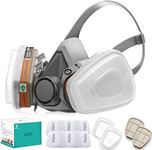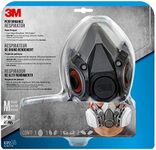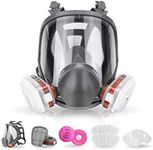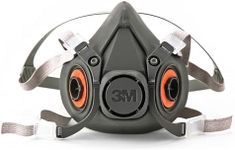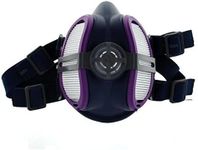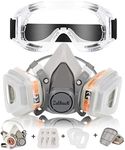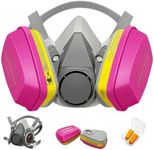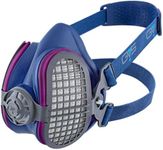Buying Guide for the Best Respirator Mask For Epoxy Resin
Choosing the right respirator mask for working with epoxy resin is crucial for your health and safety. Epoxy resin can release fumes and particles that may be harmful if inhaled, so a good mask will help protect your lungs and overall well-being. When shopping for a respirator mask, it's important to understand the key features that make a mask effective for this specific use. By focusing on the right specifications, you can ensure that you are well-protected and comfortable while working with epoxy resin.Filter TypeThe filter type determines what kind of particles and fumes the mask can block. For epoxy resin, you need a mask that can filter out organic vapors and fine particles. Filters are usually labeled with codes like 'P100' for particulates and 'OV' for organic vapors. Some masks use replaceable cartridges, while others have built-in filters. If you are mainly concerned about fumes, look for organic vapor cartridges. If you also want protection from dust, a combination cartridge is best. Your choice should depend on whether you are only dealing with fumes, or if sanding and dust are also involved in your work.
Fit and SealA good fit and seal are essential for a respirator mask to work properly. If the mask does not fit your face well, harmful fumes can leak in around the edges. Masks come in different sizes and shapes, and some have adjustable straps or nose pieces to help create a tight seal. When choosing a mask, consider your face shape and look for one that offers a snug, comfortable fit. If you wear glasses or have facial hair, you may need to try different styles to find one that seals well for you.
Comfort and BreathabilityComfort and breathability are important because you may need to wear the mask for extended periods. Some masks are lightweight and have soft materials or padding, while others may feel heavier or more rigid. Breathability refers to how easy it is to inhale and exhale while wearing the mask. If you plan to work for long sessions, look for a mask that is comfortable and allows you to breathe easily without feeling restricted. Trying on different styles can help you find one that suits your needs.
Reusable vs. DisposableRespirator masks can be either reusable or disposable. Reusable masks are made of durable materials and use replaceable filters or cartridges, making them a good choice if you work with epoxy resin regularly. Disposable masks are designed for single or limited use and are usually less expensive upfront. If you only occasionally work with epoxy resin, a disposable mask may be sufficient. Think about how often you will use the mask and whether you prefer the convenience of disposables or the long-term value of a reusable mask.
Certification and StandardsCertification and standards indicate that a mask has been tested and meets certain safety requirements. Look for masks that are certified by recognized organizations, such as NIOSH (National Institute for Occupational Safety and Health) in the United States. These certifications ensure that the mask provides a certain level of protection. Always check for certification labels or markings to make sure the mask is suitable for use with chemicals like epoxy resin. This is especially important if you are using the mask in a professional or regulated environment.
